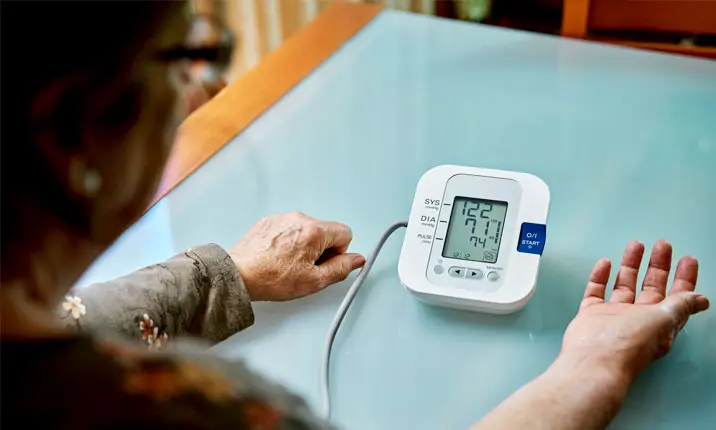-
-
Khu vực chăm sóc và điều trị


Nguồn: Getty Images
Chương Trình Quản Lý Bệnh Mãn Tính: Có Phù Hợp Với Bạn Không?
Cập nhật lần cuối: 30 Tháng Tám 2022 | 6 phút - Thời gian đọc
Tìm hiểu thêm về bệnh mãn tính là gì, và cách bác sĩ gia đình thường trực có thể hỗ trợ bạn kiểm soát bệnh với Chương Trình Quản Lý Bệnh Mãn Tính.
Nhiều người Singapore mắc phải các bệnh mãn tính, được định nghĩa là những bệnh hay vấn đề sức khoẻ có thời gian kéo dài ít nhất 3 tháng hoặc lâu hơn, và có khả năng tệ thêm theo thời gian. Các bệnh mãn tính phổ biến tại Singapore trong giai đoạn từ năm 2021 đến 2022, trong nhóm từ 18 đến 74 tuổi, bao gồm cao huyết áp, tiểu đường, và tăng mỡ máu (cholesterol cao). Các vấn đề sức khỏe này đã ảnh hưởng đến 37%, 9.5%, và 31.9% tổng dân số, tương ứng.
Bệnh mãn tính có thể được kiểm soát hiệu quả thông qua việc kiểm tra sức khỏe định kỳ với bác sĩ gia đình, hỗ trợ bác sĩ hiểu rõ hơn về tình trạng của bạn, lối sống, và sở thích. Điều này sẽ nâng cao đáng kể khả năng điều chỉnh phác đồ điều trị của bác sĩ và đưa ra những lời khuyên sức khỏe giúp cải thiện sức khỏe tổng quát của bạn.
Các bệnh mãn tính phổ biến
Dưới đây là một vài vấn đề sức khỏe mãn tính phổ biến thuộc Chương Trình Quản Lý Bệnh Mãn Tính (CDMP) mà bác sĩ gia đình có thể hỗ trợ quản lý. CDMP là một chương trình quốc gia hiện hữu tại các phòng khám chăm sóc sức khỏe ban đầu như các phòng khám đa khoa của Parkway Shenton.
- Đái tháo đường / tiền đái tháo đường
- Tăng huyết áp
- Tăng mỡ máu (các vấn đề về chất béo trong máu)
- Viêm xương khớp
- Bệnh gút
- Viêm mũi dị ứng
- Hen suyễn
- Bệnh phổi tắc nghẽn mãn tính (COPD)
- Viêm gan B mạn tính
- Rối loạn lo âu
- Tâm thần phân liệt
- Trầm cảm nặng
- Rối loạn lưỡng cực
- Chứng mất trí
Từ 1 tháng 1 năm 2021, thuộc khuôn khổ CMDP, các bệnh nhân có thể yêu cầu lên tới 500 đô la Singapore mỗi năm từ tài khoản MediSave cho việc điều trị các vấn đề sức khỏe này, và những người mắc các dạng phức tạp của bệnh mãn tính có thể yêu cầu lên tới 700 đô la Singapore mỗi năm. Tuy nhiên, mỗi yêu cầu chi trả từ MediSave cần chi trả thêm một khoản 15% bằng tiền mặt.
Thông qua CDMP, những người có thẻ Community Health Assist Scheme (CHAS - Chương trình Hỗ trợ Sức khỏe Cộng đồng) mắc phải các vấn đề sức khoẻ mãn tính có thể tiếp cận trợ cấp lên tới 500 đô la Singapore một năm từ chính phủ, giúp chi trả cho dịch vụ chăm sóc y tế tại các phòng khám tham gia, bao gồm những phòng khám thuộc Parkway Shenton, với một mức phí phải chăng hơn. Bên cạnh đó, mức trợ cấp đặc biệt lên đến 540 đô la Singapore mỗi năm cũng có sẵn cho những người có thẻ Pioneer Generation hoặc Merdeka Generation.
Các dịch vụ dành cho bệnh nhân bệnh mãn tính tại Parkway Shenton
Parkway Shenton cung cấp nhiều dịch vụ đa dạng nhằm hỗ trợ quá trình kiểm soát bệnh mãn tính tối ưu và hiệu quả cho bệnh nhân.
Những dịch vụ này bao gồm các dịch vụ khám sàng lọc đặc biệt dành cho bệnh nhân đái tháo đường, chẳng hạn như kiểm tra thị lực và bàn chân, và các bệnh nhân tim, chẳng hạn như kiểm tra huyết áp ngoại trú, bên cạnh các dịch vụ tư vấn sức khỏe, chỉ dẫn về diet và dinh dưỡng, kiểm tra thiết bị dụng cụ y tế, các chương trình cai thuốc lá.
Dưới đây là một cái nhìn kỹ hơn về một vài dịch vụ dành riêng cho bệnh nhân:
Tư Vấn Sức Khỏe
Việc mới được chẩn đoán mắc bệnh mãn tính có thể tạo ra cảm giác choáng ngợp, đặc biệt với lượng thông tin quá lớn cần tiếp nhận trong thời gian ngắn mà không hiểu biết nhiều về cách thức hay nên bắt đầu từ đâu.
Việc tư vấn sức khỏe bởi đội ngũ bác sĩ và y tá Parkway Shenton có thể hỗ trợ bạn hiểu rõ hơn về vấn đề sức khỏe của bản thân. Tư vấn có thể được thực hiện thông qua một buổi gặp trực tiếp tại phòng khám Parkway Shenton hoặc thông qua một buổi tư vấn từ xa.
Chỉ Dẫn Về Diet Và Dinh Dưỡng
Sử dụng đúng thực phẩm thường là bước quan trọng nhất trong việc kiểm soát các bệnh mãn tính như đái tháo đường, cao huyết áp, và cholesterol cao. Tư vấn diet có thể hướng dẫn bệnh nhân xác định các khu vực trong kế hoạch ăn uống cần cải thiện, và cung cấp các mẹo và lời khuyên để thực hiện những thay đổi trong chế độ dinh dưỡng một cách hiệu quả.
Đánh Giá và Tư Vấn Thiết Bị Y Tế
Mới được chẩn đoán mắc tiểu đường nhưng không chắc chắn về việc kiểm tra lượng đường trong máu? Một buổi tư vấn với y tá có thể hỗ trợ bạn nắm được các kỹ năng cần thiết để quản lý vấn đề sức khỏe. Điều này bao gồm việc chỉ dẫn cách sử dụng máy đo đường huyết tại nhà để kiểm tra đường huyết, cách tiêm insulin, và cách kiểm tra huyết áp chính xác một cách độc lập, sử dụng huyết áp kế gia đình.
Cai Thuốc Lá
Cai thuốc là một trong những thay đổi quan trọng nhất về lối sống mà các bệnh nhân mắc bệnh mãn tính có thể tự thực hiện. Bệnh nhân tham gia một chương trình tư vấn cai thuốc lá chuyên biệt có khả năng cai thuốc lá thành công cao gấp đôi so với những người cố gắng tự cai thuốc.
Các Xét Nghiệm Sàng Lọc
Khám sức khỏe là một trong những cách thức hiệu quả nhất để theo dõi tình trạng hay sự tiến triển của một bệnh mãn tính. Dưới đây là một vài ví dụ:
Xét Nghiệm Mắt Và Bàn Chân Cho Bệnh Nhân Tiểu Đường
Đái tháo đường có thể dẫn đến các biến chứng liên quan đến mắt và bàn chân. Để cho phép phát hiện sớm và ngăn ngừa tổn thương, việc xét nghiệm hàng năm được khuyến khích.
Bệnh lý võng mạc do tiểu đường, hay được biết với cái tên võng mạc bệnh do tiểu đường, là một trong những biến chứng phổ biến nhất của đái tháo đường và là nguyên nhân hàng đầu gây mù lòa ở người lao động trưởng thành. Nhìn chung, một phần ba bệnh nhân tiểu đường mắc bệnh lý mắt, và 1 trong 10 mắc võng mạc bệnh do tiểu đường với tình trạng đe dọa thị lực.
Khám sàn lọc mắt cho bệnh nhân tiểu đường là thiết yếu để phát hiện liệu người bệnh có đang gặp nguy cơ phát triển các biến chứng ở mắt do tiểu đường hay không. Xét nghiệm này mất khoảng 30 phút, trong đó y tá sẽ chụp ảnh võng mạc để kiểm tra dấu hiệu sớm của bệnh lý về mắt. Thuốc nhỏ mắt có thể được sử dụng để hỗ trợ làm giãn đồng tử và tạo điều kiện dễ dàng cho quá trình này.
Singapore cũng thuộc top các quốc gia có tỷ lệ cắt cụt chi dưới cao nhất thế giới, và tiểu đường là một yếu tố nguy cơ quan trọng. Nguy cơ mắc viêm loét bàn chân trong đời này rơi vào khoảng 15%, nhưng đối với những người mắc tiểu đường, tỷ lệ này có thể cao đến 25%. Sự xuất hiện của viêm loét bàn chân ở bệnh nhân tiểu đường cũng là yếu tố gây nên nguy cơ cắt cụt chi, do 84% các trường hợp cắt cụt chi không do chấn thương bắt đầu từ viêm loét bàn chân, và rủi ro này lớn gấp 25 lần so với bệnh nhân không mắc tiểu đường.
Để giúp ngăn ngừa vấn đề này, khám sàng lọc bàn chân hàng năm có thể hỗ trợ phát hiện sớm các vấn đề về chân. Xét nghiệm này mất khoảng 30 phút, và bao gồm việc quan sát trực tiếp bàn chân của bệnh nhân để kiểm tra cảm giác tê và tìm kiếm các dấu hiệu sớm của vấn đề liên quan đến tuần hoàn máu, vết thương, và viêm loét. Y tá có thể đưa ra lời khuyên về chăm sóc chân và cách chăm sóc móng chân đúng cách để ngăn ngừa các bệnh nhiễm trùng da quanh móng.
Theo Dõi Huyết Áp Ngoại Trú
Do cao huyết áp ảnh hưởng đến một tỷ lệ lớn dân số, bác sĩ có thể chỉ định các xét nghiệm huyết áp ngoại trú cho những người mắc hội chứng áo choàng trắng hoặc gặp khó khăn trong việc kiểm soát huyết áp.
Việc này được thực hiện bằng cách gắn một thiết bị theo dõi vào cổ tay trong 24 giờ. Định kỳ, huyết áp của bệnh nhân sẽ được tự động đo và ghi lại trong thiết bị. Thiết bị này sau đó sẽ được trả lại cho y tá vào cuối chu kỳ 24 giờ, từ đó bác sĩ có thể phân tích số liệu.
Số liệu huyết áp trong 24 giờ mang lại cái nhìn sâu sắc có giá trị về tình trạng của bệnh nhân khi họ thực hiện các công việc hàng ngày và khi ngủ, có thể tiết lộ nhiều thông tin về sức khỏe của bạn, chẳng hạn:
- Độ chênh lệch giữa các lần đo huyết áp thực hiện tại nhà và tại phòng khám
- Phát hiện hội chứng tăng huyết áp áo choàng trắng
- Huyết áp khó kiểm soát
- Xác định tình trạng cao huyết áp về đêm (dành cho bệnh nhân có nguy cơ tim mạch cao hơn)
Phòng Bệnh Hơn Chữa Bệnh
Xây dựng một mối quan hệ với bác sĩ chăm sóc sức khỏe ban đầu sẽ giúp bác sĩ hiểu rõ hơn các rủi ro về sức khỏe của bạn và kê đơn các giải pháp phòng ngừa nhằm hỗ trợ. Giải pháp này có thể đơn giản như khám sức khỏe định kỳ hoặc tiêm chủng nhằm ngăn ngừa bệnh tật. Qua thời gian, việc chăm sóc sức khoẻ phòng bệnh này có thể giúp tiết kiệm chi phí bằng cách giảm thiểu rủi ro gặp biến chứng do điều trị muộn hoặc bệnh không được điều trị.
Một vài ví dụ của các xét nghiệm sức khỏe có thể được chỉ định bởi bác sĩ bao gồm:
- Chụp quang tuyến vú để sàng lọc ung thư vú
- Phết tế bào cổ tử cung để sàng lọc ung thư cổ tử cung
- Xét nghiệm phân để sàng lọc ung thư đại tràng
Hãy trao đổi với bác sĩ và tìm kiếm phòng khám Parkway Shenton gần nhất tại đây và đặt lịch hẹn cho một buổi kiểm tra y tế.
Over-60s suffering more with chronic diseases than a decade ago: Study. The Straits Times. Retrieved on 17 August from https://www.straitstimes.com/singapore/health/over-60s-suffering-more-with-chronic-diseases-than-a-decade-ago-study
Chronic Disease Management Programme (CDMP). Ministry of Health. Retrieved on 17 August 2022 from https://www.moh.gov.sg/policies-and-legislation/chronic-disease-management-programme-(cdmp)
Chronic disease - NCI Dictionary. National Cancer Institute. Retrieved on 17 August 2022 from https://www.cancer.gov/publications/dictionaries/cancer-terms/def/chronic-disease
(2020, 28 July) Primary care visits increase utilization of evidence-based preventative health measures, BMC Family Practice 21, Article number 151 (2020). Retrieved on 17 August 2022.
Lee, V. J., Chen, M. I., Chan, S. P., Wong, C. S., Cutter, J., Goh, K. T., & Tambyah, P. A. (2007). Influenza pandemics in Singapore, a tropical, globally connected city. Emerging infectious diseases, 13(7), 1052–1057. https://doi.org/10.3201/eid1307.061313. Retrieved on 17 August 2022.
(2020) Handbook on Adult Vaccination in Singapore, 2020 Society of Infectious Diseases Singapore College of Family Physicians, Singapore Chapter of Infectious Disease Physicians. Retrieved on 17 August 2022.
(2021) Shringrix Summary Report of Benefit-Risk Assessment. Health Sciences Authority of Singapore. Retrieved on 17 August 2022.
Muthiah, M., H Chong, C., & G Lim, S. (2018). Liver Disease in Singapore. Euroasian journal of hepato-gastroenterology, 8(1), 66–68. https://doi.org/10.5005/jp-journals-10018-1262. Retrieved on 17 August 2022.
Wong, T. Y., & Sabanayagam, C. (2019). The War on Diabetic Retinopathy: Where Are We Now?. Asia-Pacific journal of ophthalmology (Philadelphia, Pa.), 8(6), 448–456. https://doi.org/10.1097/APO.0000000000000267. Retrieved on 15 August 2022.
Speech by Mr Gan Kim Yong, Minister for Health, At the opening ceremony of World Diabetes Day Singapore 2018, 4 November 2018. Retrieved on 15 August 2022 from https://www.moh.gov.sg/news-highlights/details/speech-by-mr-gan-kim-yong-minister-for-health-at-the-opening-ceremony-of-world-diabetes-day-singapore-2018-4-november-201
Riandini, T., Pang, D., Toh, M., Tan, C. S., Choong, A., Lo, Z. J., Chandrasekar, S., Tai, E. S., Tan, K. B., & Venkataraman, K. (2022). National Rates of Lower Extremity Amputation in People With and Without Diabetes in a Multi-Ethnic Asian Population: a Ten Year Study in Singapore. European journal of vascular and endovascular surgery : the official journal of the European Society for Vascular Surgery, 63(1), 147–155. https://doi.org/10.1016/j.ejvs.2021.09.041. Retrieved on 15 August 2022.
Meysman, M., Boudrez, H., Nackaerts, K., Dieriks, B., Indemans, R., & Vermeire, P. (2010). Smoking Cessation Rates After a Nurse-Led Inpatient Smoking Cessation Intervention. Journal of Smoking Cessation, 5(1), 69-76. doi:10.1375/jsc.5.1.69. Retrieved on 14 August 2022.
Aziz Nather, FRCSE, Shuo Cao, Jamie Li Wen Chen, et al. Prevention of diabetic foot complications . Singapore Med J 2018; 59(6): 291-294. Retrieved on 14 August 2022 from https://doi.org/10.11622/smedj.2018069
Tessa Riandini, Deanette Pang, Matthias P H S Toh, Chuen S Tan, Andrew M T L Choong, Zhiwen J Lo, Sadhana Chandrasekar, E Shyong Tai, Kelvin B Tan, Kavita Venkataraman. National Rates of Lower Extremity Amputation in People With and Without Diabetes in a Multi-Ethnic Asian Population: a Ten Year Study in Singapore. Retrieved on 14 August 2022 from PMID: 34916107 DOI: 10.1016/j.ejvs.2021.09.041
Chronic Disease Management Programme (CDMP). Ministry of Health. Retrieved on 17 August 2022 from https://www.moh.gov.sg/policies-and-legislation/chronic-disease-management-programme-(cdmp)
Chronic disease - NCI Dictionary. National Cancer Institute. Retrieved on 17 August 2022 from https://www.cancer.gov/publications/dictionaries/cancer-terms/def/chronic-disease
(2020, 28 July) Primary care visits increase utilization of evidence-based preventative health measures, BMC Family Practice 21, Article number 151 (2020). Retrieved on 17 August 2022.
Lee, V. J., Chen, M. I., Chan, S. P., Wong, C. S., Cutter, J., Goh, K. T., & Tambyah, P. A. (2007). Influenza pandemics in Singapore, a tropical, globally connected city. Emerging infectious diseases, 13(7), 1052–1057. https://doi.org/10.3201/eid1307.061313. Retrieved on 17 August 2022.
(2020) Handbook on Adult Vaccination in Singapore, 2020 Society of Infectious Diseases Singapore College of Family Physicians, Singapore Chapter of Infectious Disease Physicians. Retrieved on 17 August 2022.
(2021) Shringrix Summary Report of Benefit-Risk Assessment. Health Sciences Authority of Singapore. Retrieved on 17 August 2022.
Muthiah, M., H Chong, C., & G Lim, S. (2018). Liver Disease in Singapore. Euroasian journal of hepato-gastroenterology, 8(1), 66–68. https://doi.org/10.5005/jp-journals-10018-1262. Retrieved on 17 August 2022.
Wong, T. Y., & Sabanayagam, C. (2019). The War on Diabetic Retinopathy: Where Are We Now?. Asia-Pacific journal of ophthalmology (Philadelphia, Pa.), 8(6), 448–456. https://doi.org/10.1097/APO.0000000000000267. Retrieved on 15 August 2022.
Speech by Mr Gan Kim Yong, Minister for Health, At the opening ceremony of World Diabetes Day Singapore 2018, 4 November 2018. Retrieved on 15 August 2022 from https://www.moh.gov.sg/news-highlights/details/speech-by-mr-gan-kim-yong-minister-for-health-at-the-opening-ceremony-of-world-diabetes-day-singapore-2018-4-november-201
Riandini, T., Pang, D., Toh, M., Tan, C. S., Choong, A., Lo, Z. J., Chandrasekar, S., Tai, E. S., Tan, K. B., & Venkataraman, K. (2022). National Rates of Lower Extremity Amputation in People With and Without Diabetes in a Multi-Ethnic Asian Population: a Ten Year Study in Singapore. European journal of vascular and endovascular surgery : the official journal of the European Society for Vascular Surgery, 63(1), 147–155. https://doi.org/10.1016/j.ejvs.2021.09.041. Retrieved on 15 August 2022.
Meysman, M., Boudrez, H., Nackaerts, K., Dieriks, B., Indemans, R., & Vermeire, P. (2010). Smoking Cessation Rates After a Nurse-Led Inpatient Smoking Cessation Intervention. Journal of Smoking Cessation, 5(1), 69-76. doi:10.1375/jsc.5.1.69. Retrieved on 14 August 2022.
Aziz Nather, FRCSE, Shuo Cao, Jamie Li Wen Chen, et al. Prevention of diabetic foot complications . Singapore Med J 2018; 59(6): 291-294. Retrieved on 14 August 2022 from https://doi.org/10.11622/smedj.2018069
Tessa Riandini, Deanette Pang, Matthias P H S Toh, Chuen S Tan, Andrew M T L Choong, Zhiwen J Lo, Sadhana Chandrasekar, E Shyong Tai, Kelvin B Tan, Kavita Venkataraman. National Rates of Lower Extremity Amputation in People With and Without Diabetes in a Multi-Ethnic Asian Population: a Ten Year Study in Singapore. Retrieved on 14 August 2022 from PMID: 34916107 DOI: 10.1016/j.ejvs.2021.09.041











